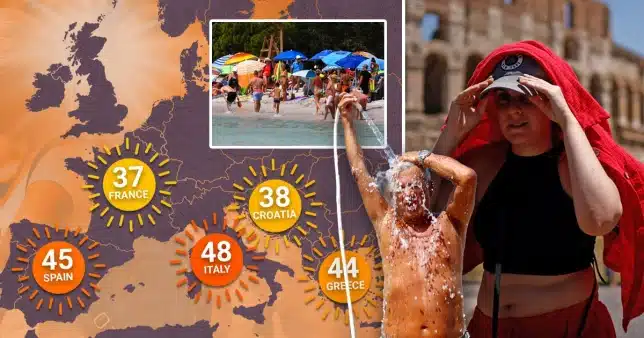After a man collapsed and died in Italy, the severe 48°C heatwave known as Cerberus was announced to tourists in Southern Europe.
Yesterday, when temperatures reached beyond 40°C, the 44-year-old was working in the city of Lodi, southeast of Milan, according to Italy24.
The man, a road sign worker, passed away at a hospital after collapsing in front of his coworkers.
Anticyclone weather system Cerberus, which is advancing over the continent from the Sahara desert, is said to have contributed to his death by causing the intense heatwave that was experienced there.
The Italian islands of Sardinia and Sicily are expected to reach a record breaking 48°C.
The general secretary of Fenealuil Milan-Cremona-Lodi-Pavia, Salvatore Cutaia, said: ‘The climate is a cause of accident and also of death. This is a situation that could be repeated given the temperatures.
‘We find ourselves once again having to mourn a 44-year-old worker who has only done his job.’
The anticyclone has been named after the three-headed dog from Greek mythology, who guards the gates to the underworld.
Meteorologist Stefano Rossi told Italian outlet La Stampa: ‘Metaphorically, the three heads indicate the three main climatic zone into which Italy will be divided.’
Thousands of holidaymakers in the Mediterranean are now being urged to take precautions in the extreme heat.
Temperatures are also predicted to rise to 45°C in southern Spain and 44°C in Greece this week.
Conditions will also rise to 42°C in Cyprus, 38°C in Croatia and France will be basking in 37°C heat by the end of this week.
Many British tourists are struggling to handle the heat, with one woman seen collapsing in front of the Colosseum in Rome as temperatures topped 36°C.
Tourists were pictured resting beneath trees while others resorted to using their shirts as parasols to shield themselves from the sun.
But the Met Office have thankfully said the UK will be spared the extreme temperatures.
It is expected the extreme hot weather will last for two weeks.
Met Office spokesperson Grahame Madge said: ‘The heatwave conditions which are affecting parts of south west Europe and north west Africa are expected to extend eastward.
‘Much higher than average temperatures are also likely at times further north across Europe, but these will be shorter lived and less impactful.
‘Communities in the affected regions should expect health impacts and the potential for wildfires.’

